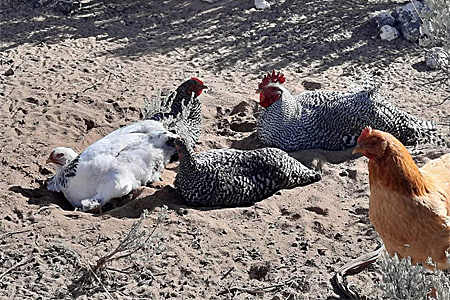
Yes, chickens really do need a dust bath. Providing a suitable area for dust bathing has several benefits. It helps chickens condition their feathers. It minimize mites and lice. And it gives chickens something pleasurable to do, which helps keep them from pecking each other out of boredom. Plus wallowing in dust can help chickens stay cool in summer.
What You Need
All you need is dirt, or rather clean, loose soil. If you have loamy soil, that’s great. If you have clay soil, you can loosen it up by mixing it with fine construction sand from the hardware store.
Chickens with access to dry soil outdoors will create their own dusting bowls. In a coop with deep litter, chickens will use it to bathe indoors during hot or rainy weather.
To prevent ankle-twisting holes from developing in the yard, you might want to confine the soil to a bin. A kiddy wading pool, or anything of similar shape and size, filled with sand or loose soil works well.
An overhead cover will keep the soil from turning to mud in rainy weather. When the dust bin is outdoors, breezes will whisk away airborne dust kicked up by bathing chickens.
If for some reason you need to situate the bin inside the coop, ventilate the shelter well enough to prevent dust particles from hanging in the air. Also, a bright overhead light will discourage hens from using the bin as a communal nest.
Dust Bath Additives
Chicken keepers like to add all sorts of things to dust bathing soil. Common additives include fireplace wood ashes, diatomaceous earth (DE), and sulfur garden powder. While adding such materials can effectively control mites and lice, it can also harm the chickens’ health.
A chicken’s respiration rate is much faster than a human’s. And, further, a chicken’s respiratory system includes delicate air sacs. These factors make chickens more susceptible to respiratory problems than we humans. Regularly breathing in materials with particle sizes and structures that different from ordinary dirt dust can make matters worse.
However, for chickens infested with mites or lice, the benefit of temporarily adding such materials may outweigh the potential danger. In that case, make doubly sure the dust bin is well ventilated.
As additives go, sulfur has advantages over both wood ash and DE. Sulfur has residual effect, where the other two do not and therefore must be furnished continuously.
Also the effectiveness of sulfur rubs off onto chickens that haven’t bathed in the sulfur-treated dust bin. With wood ashes and DE, only chickens that actually dust bathe benefit from the anti-parasitic effects.
Will Chickens Use It?
Most chickens so instinctively dust bathe that even baby chicks in a brooder will flap to cover themselves in loose bedding material. You can encourage this healthful activity by furnishing the brooder with a shallow bowl of plain loose soil.
By flapping their wings and kicking their legs, chickens work the soil through their feathers. Sometimes they then lie quietly in the dirt, much like a human luxuriating in a hot water bath. And just like you might feel you really need a bath after a busy day, so, too, do chickens really need a dust bath to remain clean and healthy.
And that’s today’s news from the Cackle Coop.
Gail Damerow is the author of The Chicken Health Handbook.


thank you for the knowledge.